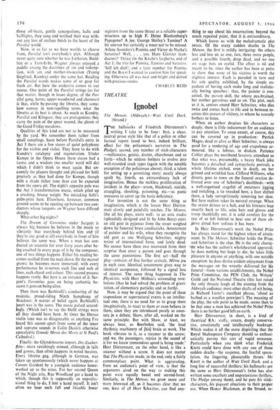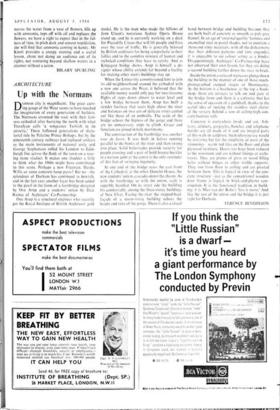THEATRE
Ignobel
The Meteor. (Aldwych.)—Wait Until Dark. (Strand.) HE hallmarks of Friedrich Durrenmatt'sTwriting I take to be four: first, a clear,
neutral prose style like that of a police or other factual report (used to best, indeed brilliant, effect for the policeman's narrative in The Pledge); second, any number of stick-characters —millionaire, genius, doctor, churchman and so forth—which he seldom bothers to evolve into well-rounded stock types (again with the notable exception of the policeman above); third, a talent for setting up a promising story; nearly always spoilt by, fourth, an extraordinary lack of imagination. Hence the reckless proliferation of incident in the plays—arson, blackmail, suicide, strangling, shooting, poisoning, etc.—as panic measures to cover up the basic deficiency.
For invention is not the same thing as imagination, which is the lesson Herr Diirren- matt slowly and painfully teaches. The Meteor, like all his plays, starts well: to an attic studio (splendidly designed and lit by John Bury) enter an old gent in pyjamas from the street weighed down by funereal brass candlesticks. Amazement of painter and his wife, when they recognise the old gent as one Wolfgang Schwitter, mighty writer of international fame, and lately dead. No sooner have these two recovered from their surprise than enter a parson and goes through the same pantomime. The first act—half the play—consists of five further arrivals. Mime jeu in each case. Identical amazement gives way to identical acceptance, followed by a signal loss of interest. The same thing happened in The Physicists, with Herr Mobius's astounding reve- lations (that he had solved the problem of gravi- tation, of elementary particles and so forth).
Now, it may be argued that the point of these stupendous or supernatural events is an intellec- tual one; there is no need for us to grasp them imaginatively, to react to them or even believe in them, since they are introduced purely as coun- ters in a debate. Shaw, after all, worked on the same principle. But with Shaw, at least, we always hear, as Beerbohm said, 'the loud rhythmic machinery of [his] brain at work. The book vibrates to it, as a steamer to the screw; and we, the passengers, rejoice in the sound of it for we know tremendous speed is being made.' Herr Diirrenmatt, on the other hand, is like a steamer without a screw. It does not matter that The Physicists made, in the end, only a fairly commonplace point. What is aggravating, from an audience's point of view, is that the arguments aired on the way to making this point were equally banal and second-hand. Similarly, in The Meteor, we grow more and more browned off, as it becomes clear that no one, least of all Herr Schwitter, can find any- thing to say about his resurrection; beyond the much repeated point, that it is extraordinary.
Which leaves us with the melodramatic plot twists. Of the many sudden deaths in The Meteor, the first is mildly intriguing; the others less and less so, as one, two, three more people, and a possible fourth, drop dead, and no one on stage bats an eyelid. The effect is nil and meant to be, since the author has been at pains to show that none of his victims is worth the slightest interest. Each is paraded in turn and his sole quality exhibited, by the simple ex- pedient of having each make long and realistic- ally boring speeches : thus, the painter is con- ceited, the parson dull, the whore pea-brained, her mother garrulous and so on. The plot, such as it is, centres round Herr Schwitter, who dies twice and comes back to life and in between re- ceives this stream of visitors, to whom he scarcely bothers to listen.
When an author despises his characters so deeply, there is little inducement for an audience to pay attention. To some extent, of course, this can be covered up in production: Patrick Magee, dead or alive as Herr Schwitter, is always good for a rendering of age and crapulence ar- moured, like a lobster, in disdain. Patience Collier plays the moribund lavatory attendant so that what was, presumably, a heavy black joke becomes a detached and sympathetic portrait, a whole lifetime etched, even in death, on her grimed and wrinkled face. Clifford Williams, who directs, goes to town on the funeral oration de- livered over one of Schwitter's deathbeds—with a well-organised stageful of mourners jigging and twitching, a tie tweaked here, a foot shifted there, a lady surreptitiously removing her shoe. But here realism takes its natural revenge. When the orator drones to a halt, and his listeners leap smartly back to life, seize hats and gloves and troop thankfully out, it is cold comfort for the rest of us left behind to hear one of them ob- jerve aloud how tedious it has been.
In Herr Durrenmatt's work the Nobel Prize has always stood for the highest token of attaih- ment. In The Meteor, Schwitter holds the Prize, and Schwitter is the clue. He is the only char#- *r who has the author's wholehearted approval; he does nothing but hope to die; he takes little pleasure in anyone or anything, with one notable exception: he does derive evident enjoyment from the messages on the wreaths delivered for his funeral—from various establishments, the Nobel Prize Committee, the PEN Club, the Writeits' Guild apd the National Theatre (this last raised the only throaty laugh of the evening froin the Aldwych audience; most other shafts of wit being, . in Richard Lester's excellent phrase, 'about as barbed as a woollen penwiper'). The meaning of the play, the sole point to be made, seems then to be that once a man has achieved the Nobel Prize there is no further good left on earth.
Herr Diirrenmatt, in short, is a kind of theatrical RA: stuffy, ornate, deeply conserva- tive, emotionally and intellectually bankrupt. Which makes it all the more dispiriting that the Royal Shakespeare Company should so enthusi- astically purvey this sort of vapid nonsense. Particularly when you think what Frederick Knott could have done with any one of those sudden deaths—the suspense, the fearful specu- lation, the lingering, pleasurable throes. Mr Knott is the author of Wait Until Dark, and. a long line of successful thrillers; his hallmarks are the same as Herr Diirrenmatt's (who has also written some excellent and unpretentious thrillers, The Pledge among them), and he puts his stick- characters, his piquant situations to their proper use. When Honor Blackman, at the Strand, re-
moves the water from a vase of flowers, fills up with ammonia, tops off with oil and replaces the flowers, we have a right to expect that in the ful- ness of time, in pitch dark and utmost trepidation, she will find that ammonia coming in handy. Mr Knott provides a creepy evening and a useful lesson, about not doing an audience out of its rights, not venturing beyond shallow waters in a steamer without a screw.
HILARY SPURLING






























 Previous page
Previous page